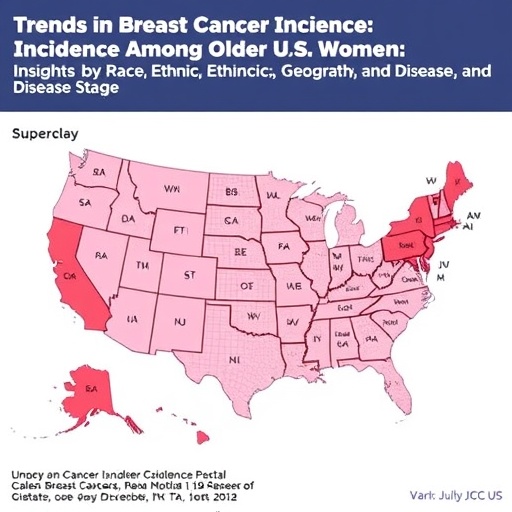In recent years, breast cancer research has increasingly underscored the nuanced interplay between demographic factors and disease incidence. A groundbreaking cross-sectional analysis focusing on breast cancer trends among older women in the United States has now revealed striking differences in incidence patterns when data are segmented by race, ethnicity, and cancer stage across various age groups. This detailed stratification lends crucial insight into how current screening guidelines may be failing to capture the complex epidemiological realities faced by these diverse populations.
The study analyzed population-level data to parse breast cancer incidence rates more finely than commonly done in past research. Conventional approaches often treat older women as a homogeneous group, thus potentially obscuring important variations aligned with biological aging and social determinants of health. By disaggregating the data into age ranges that correlate more precisely with clinical screening recommendations, the researchers were able to observe distinct racial and ethnic disparities as well as stage-specific incidence trends previously masked in broader analyses.
These findings are significant because they suggest current breast cancer screening practices—typically generalized across broad age brackets—may inadequately reflect the risk profiles present in different subpopulations. For example, certain racial groups were found to experience increased rates of late-stage breast cancers at ages where screening might be less frequent or guidelines more ambiguous. Such disparities point to systemic issues in healthcare access, cultural barriers, or biological differences that warrant further investigation.
.adsslot_5EXRWDk7qC{ width:728px !important; height:90px !important; }
@media (max-width:1199px) { .adsslot_5EXRWDk7qC{ width:468px !important; height:60px !important; } }
@media (max-width:767px) { .adsslot_5EXRWDk7qC{ width:320px !important; height:50px !important; } }
ADVERTISEMENT
Moreover, the observed variations in incidence across stages and ethnicities raise critical questions about the contribution of screening behaviors to these patterns. Screening mammography, a cornerstone of early breast cancer detection, is influenced by socioeconomic factors, healthcare engagement, and perceived risk. The study calls for urgent research to dissect how disparities in screening uptake and interval timing may be driving the differential incidence and survival outcomes noted in older women.
From a clinical perspective, the implications are profound. Breast cancer remains one of the most common malignancies among women, and improved detection strategies tailored to distinct age and ethnic groups could meaningfully enhance prognosis and reduce mortality. This research advocates for a recalibration of screening guidelines to be more granular and culturally sensitive, potentially integrating risk stratification tools that incorporate demographic data to optimize screening intervals and modalities.
Technologically, the study exemplifies the power of advanced epidemiological methods and large-scale data analytics in generating actionable public health knowledge. Tools that enable age- and ethnicity-specific incidence tracking empower stakeholders—from clinicians to policy makers—to design interventions that address disparities rather than applying one-size-fits-all solutions. Such innovations in data utilization may herald a new era in personalized population health management.
The study’s methodology involved rigorous cross-sectional analysis, leveraging national cancer registries to ensure comprehensive coverage and validity. Maintaining methodological rigor was essential to uncover subtle incidence patterns that could influence future screening and healthcare delivery frameworks. The integration of racial and ethnic categorization alongside clinical staging provides an enriched understanding of the multifactorial nature of breast cancer epidemiology.
While the findings are compelling, the authors emphasize the necessity for further longitudinal research to establish causality and explore the mechanisms underlying observed trends. Particularly, prospective studies could examine screening frequency, access barriers, tumor biology variations, and socioeconomic determinants in more depth. Such investigations are expected to elucidate the pathways by which disparities in breast cancer incidence and mortality evolve in older populations.
The study also invites reflection on the broader public health implications of an aging population. As the demographic shift towards older age groups accelerates, understanding how cancer risk manifests differently across subpopulations becomes increasingly critical. Tailored screening approaches grounded in robust epidemiological evidence are essential to mitigate the burden of late-stage breast cancer diagnoses and improve health equity.
In conclusion, this meticulous analysis of breast cancer incidence among older U.S. women challenges existing screening paradigms and spotlights the urgent need for more nuanced, data-driven approaches. It reinforces an evolving paradigm in oncology and public health: that precision in prevention and detection requires acknowledging and addressing the heterogeneity inherent in patient populations, especially when stratified by age, race, and ethnicity.
Moving forward, clinical guidelines, healthcare providers, and research institutions must consider these insights to design and implement interventions that are both equitable and effective. The synergy of epidemiologic research, technology, and culturally competent healthcare delivery holds promise for transforming breast cancer outcomes among older women nationwide, potentially saving lives and optimizing resource allocation.
This study represents a pivotal step in recognizing the complexity of breast cancer epidemiology in aging women and underscores a growing consensus that effective cancer control demands a personalized and population-sensitive framework. The evolving landscape challenges researchers and clinicians alike to rethink traditional approaches and embrace innovations that reflect the diversity of American women.
Subject of Research: Breast cancer incidence trends among older U.S. women, with a focus on racial, ethnic, and stage-specific patterns relative to age groups.
Article Title: [Not provided]
News Publication Date: [Not provided]
Web References: [Not provided]
References: (doi:10.1001/jamanetworkopen.2025.16947)
Image Credits: [Not provided]
Keywords: Breast cancer, incidence trends, racial disparities, ethnic disparities, older women, cancer screening, epidemiology, public health, cancer staging, healthcare access, mammography, epidemiological analysis
Tags: breast cancer incidence trendsdemographic factors in cancer researchdisease stage differences in breast cancerethnic variations in breast cancer ratesimpact of geography on cancer incidencelate-stage breast cancer prevalencenuanced epidemiological insights in cancerolder women breast cancer statisticspopulation-level cancer analysisracial disparities in breast cancerscreening guidelines for older womensocial determinants of health in cancer





